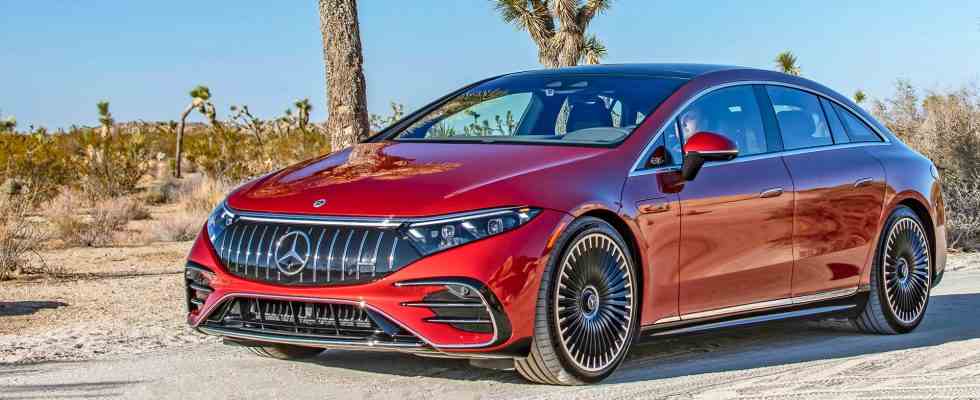Status: 03/29/2023 12:52 p.m
The sovereign wealth fund Kuwait blows to partial withdrawal at Mercedes-Benz. But one thing will certainly not change as a result: the majority of Mercedes dividends will continue to flow abroad.
Kuwait has probably been Daimler’s most loyal shareholder. The sovereign wealth fund of the small, oil-rich country has been a major shareholder in Mercedes-Benz since 1974. But now the Kuwaitis are no longer so particular about their loyalty, they are withdrawing from the Stuttgart car manufacturer and selling around 20 million of their Mercedes-Benz shares for almost 1.4 billion euros.
The partial sale reduces the Kuwait Investment Authority (KIA) stake from 6.84 to 4.95 percent. KIA now holds around 53 million shares of the 1.07 billion Mercedes-Benz shares.
Experts suspect profit-taking as the reason
The move in Kuwait is justified with the succinct note that they want to position themselves more broadly. Market observers, on the other hand, speak of profit-taking. “Kuwait primarily wants to seize the opportunity to cash in,” an analyst, who may be named, told the press tagesschau.de. “Behind this is also the expectation: It won’t get any nicer,” emphasizes the expert with a view to the share price.
Since the top management decided on the new luxury strategy, the Mercedes-Benz share has performed well, with a price increase of around 30 percent in the past six months alone.
Mercedes-Benz without a reliable German anchor shareholder
The partial withdrawal of Kuwait’s sovereign wealth fund highlights the shareholder structure of the German premium car manufacturer. A big difference to the other German car companies immediately catches the eye: While VW with the state of Lower Saxony and BMW with the Quandt family have reliable German anchor shareholders, the free float at Mercedes-Benz is currently almost 65 percent extremely high.
This makes the company more vulnerable in times when aggressive investors from outside are increasingly sneaking up on a company and trying to influence business policy by acquiring shares. “In theory, Mercedes-Benz is the only German car company that is relatively easy to take over,” explains the economist.
China holds nearly 20 percent of Mercedes-Benz voting rights
In addition, Kuwait is not the only foreign investor holding large shares in Mercedes-Benz. The Chinese are even more involved in the DAX group. Most recently, the BAIC Group held 9.98 percent of the shares, making it the largest single Mercedes shareholder. Chinese investor Li Shufu is in second place. The Geely boss holds a 9.68 percent stake through Tenaciou3 Prospect Investment Limited.
If the shares of the two Chinese shareholders were to be combined, there would not be much left to achieve a blocking minority of over 25 percent. Together, the Chinese could have a say in business policy at Mercedes-Benz and block important decisions. Both Mercedes-Benz and experts repeatedly point out that the two Chinese investors must be viewed completely separately from one another; However, such a merger cannot be completely ruled out for the future, the analyst explains tagesschau.de.
However, he sees the real Chinese challenge for Mercedes less in the shareholder structure than in the wave of electric cars. “There are currently 20 to 30 Chinese car brands that are pushing into Europe. That’s good for customers because it will push prices down. But for Mercedes, VW and Co. it’s a huge problem.”
What German investors are missing from Mercedes-Benz
German investors also have a problem with regard to Mercedes-Benz, as according to calculations by the consulting company EY, they only make up 35 percent of the shareholders. According to the DAX group, their share among institutional investors is only 7.7 percent. Whenever Mercedes-Benz opens its coffers and its shareholders share in the profits, the tills ring above all in Beijing, Hong Kong and Kuwait – and less so in Berlin, Düsseldorf or Frankfurt.
It is about enormous dimensions: in 2022 Mercedes-Benz was the largest dividend payer in the DAX, the Stuttgart company distributed 5.4 billion euros to its shareholders. According to EY, 3.5 billion euros went abroad, 1.9 billion to investors from Germany.
May is payday at Mercedes
In 2023 Mercedes-Benz wants to go one better with the dividend: The Stuttgart-based company wants to pay 5.20 euros per share and thus a dividend that is 20 cents higher than in the previous year to its shareholders for the 2022 financial year. Based on yesterday’s closing price (EUR 69.79), this corresponds to a dividend yield of 7.5 percent.
If you want to benefit from the dividend payment, you must own the share on the day of the Annual General Meeting, i.e. on May 3rd. The pro rata distribution of profits will then be credited on May 4th.

